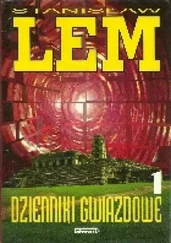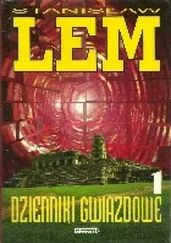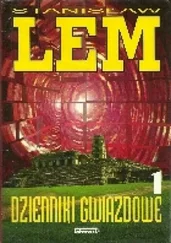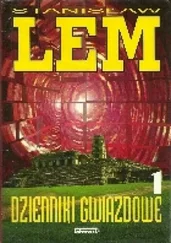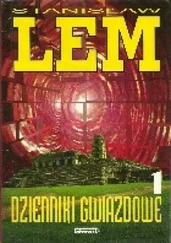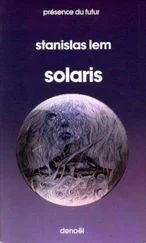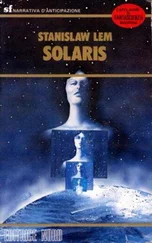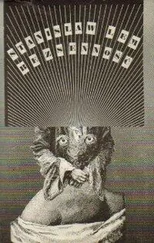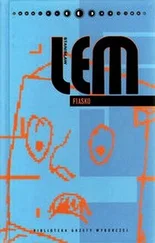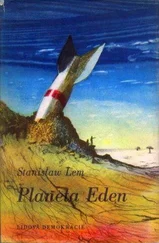If I hadn’t been paralyzed by what I’d seen I probably would have attempted to run. Harey was gasping for breath, knocking her head against my shoulder, her hair flying every which way. When I held her I could feel her slipping through my arms. I carried her back into the room, squeezing past the shattered door, and laid her on the bunk. Her fingernails were broken and covered with blood. When she turned her hand I saw the palm was chafed to raw flesh. I looked into her face; her wide-open eyes stared through me expressionless.
“Harey!”
She responded with an inarticulate grunt.
I moved my finger close to her eye. The lid closed. I went to the medicine cabinet. The bunk creaked. I turned around. She was sitting up straight, gazing at her bloodied hands in alarm.
“Kris,” she moaned, “I… I… What happened to me?”
“You hurt yourself breaking down the door,” I said impassively. There was a feeling in my lips, especially the lower one, as if ants were crawling all over it. I clamped it between my teeth.
Harey looked for a moment at the jagged pieces of plastic hanging loose from the frame and turned her eyes to me. Her chin trembled. I could see her struggling to master her alarm.
I cut a strip of gauze, took some powder for abrasions from the cabinet, and went back to the bunk. But all at once everything I was carrying slipped out of my hands; the glass jar with its gelatin seal broke, but I didn’t even pick it up. It was no longer needed.
I picked up her hand. There was a still a faint outline of blood around the fingernails, but the bruising had disappeared, and the palm was covered with fresh pink skin that was lighter than its surroundings, though the wound was fading almost as I watched.
I sat down, stroked her cheek and tried to smile at her, though I can’t say I succeeded.
“Why did you do it, Harey?”
“No. That was… me?”
She indicated the door with her eyes.
“Yes. Don’t you remember?”
“No. I mean, I saw you were gone, I got really scared, and…”
“And what?”
“I started looking for you. I thought maybe you were in the bathroom…”
It was only now I noticed that the locker had been slid aside to reveal the entrance to the bathroom.
“And then?”
“I ran to the door.”
“And?”
“I don’t remember. Something must have happened.”
“What?”
“I don’t know.”
“What do you remember? What happened next?”
“I was sitting here on the bed.”
“You don’t remember me carrying you here?”
She hesitated. The corners of her mouth drooped, her face was intent.
“I guess. Maybe. I really can’t say.”
She lowered her feet to the floor and stood up. She went up to the broken door.
“Kris!”
I put my arms around her shoulders from behind. She was shaking. All at once she turned and sought my eyes.
“Kris,” she whispered, “Kris.”
“Take it easy.”
“Kris, what if… Kris, do I have epilepsy?”
Epilepsy? Dear God! I felt like laughing.
“Of course not, darling. It’s just a door, you know, they have these kind of doors here…”
We left the room when the outer plating rose over the windows with its drawn-out grinding sound, revealing the disk of the sun setting into the ocean.
I headed for the small galley at the far end of the corridor. Harey and I worked together, checking out the cabinets and refrigerators. I quickly realized she wasn’t much of a cook and couldn’t do a lot more than open a few cans, much like me. I wolfed down the contents of two of the cans and drank endless cups of coffee. Harey ate too, but the way children sometimes eat, so as not to hurt the feelings of the grown-ups — not exactly forcing themselves, but mechanically and indifferently.
The two of us went together to the small surgery next to the radio station. I had a plan. I told her I wanted to examine her just in case. I sat her down in a folding chair and took a hypodermic syringe and needle from the sterilizer. I knew where everything was almost by heart, we’d been so well prepared at the training copy of the Station on Earth. I took a drop of blood from her finger, prepared a smear, dried it in the exhauster and sprinkled it with silver ions in a high vacuum.
The matter-of-factness of this work had a calming effect. Harey, resting on the cushions of the folding chair, was looking around the interior of the room, cluttered with apparatus.
The silence was broken by the ringing of the internal telephone. I picked up the receiver.
“Kelvin,” I said. I didn’t take my eyes off Harey, who for some time now had been apathetic, as if she’d been exhausted by her experiences in the last few hours.
“You’re in the surgery? Finally!” I heard what sounded like a sigh of relief.
It was Snaut. I waited with the receiver pressed to my ear.
“You have a ‘guest,’ eh?”
“Yes.”
“And you’re busy?”
“Yes.”
“A little examination perhaps?”
“What of it? Are you looking for a chess partner?”
“Give it a rest, Kelvin. Sartorius wants to see you. That is, see us.”
“That’s something new,” I said, surprised. “What about the…” I broke off and added:
“Is he alone?”
“No. I misspoke. He wants to talk with us. The three of us can connect by visuphone, he’s going to cover up the screen.”
“Is that so? Why didn’t he just call me directly? Is he embarrassed?”
“Something like that,” Snaut muttered indistinctly. “Well then?”
“You want to set a time? Let’s say in an hour. OK?”
“OK.”
I could see him on the screen, just his face, no bigger than the palm of my hand. For a moment that was filled with the faint hum of current, he looked searchingly into my face.
In the end he said with a certain hesitation:
“How’s life?”
“Bearable. You?”
“I’m guessing a bit worse than for you. Could I…”
“You want to come see me?” I guessed. I glanced over my shoulder at Harey. Her head hung over the cushion; she was lying with her legs crossed, in her boredom absentmindedly tossing up the silver ball at the end of a chain attached to the arm of the chair.
“Leave that alone, you hear? Leave it!” I heard Snaut’s raised voice. On the screen I could see him in profile. I didn’t catch the rest, he covered the microphone with his hand, but I saw his lips move.
“No, I can’t come. Maybe later. In an hour, then,” he said quickly, and the screen went blank. I hung up the receiver.
“Who was that?” Harey asked indifferently.
“Just this guy. Snaut. A cybernetician. You don’t know him.”
“Is it going to take much longer?”
“Are you bored?” I asked. I placed the first of a series of slides in the holder of the neutrino microscope and one by one flipped the colored switches. The force fields set up a hollow drone. “There’s not much in the way of entertainment around here. If my modest company isn’t enough for you, things are going to get tough,” I said, distractedly elongating the pauses between words as I simultaneously used both hands to pull the huge black head of the microscope toward me, and pressed my eyes into the soft rubber cup of the gleaming eyepiece. Harey said something I didn’t catch. I saw from above, sharply foreshortened, a vast wilderness flooded by a silvery glow. On it, in a hazy mist there lay flat round rocks that looked shattered and weather-beaten. These were the red corpuscles. I focused the image without removing my eyes; it was as if I were sailing ever deeper into the silvery radiance of the field of vision. At the same time, with my left hand I operated the crank that turned the stage, and when a blood corpuscle solitary as an erratic boulder appeared between the cross-hairs, I increased the magnification. The lens zoomed in on what seemed like a misshapen erythrocyte, sagging in the middle, which already resembled the rim of a rocky crater, with distinct black shadows in the indentations around its ring like edge. The rim, bristling with crystallized accumulations of silver ions, stretched beyond the edge of the microscope’s field. Murky outlines of half-fused, twisting protein chains came into view, as if seen through opalescent water. When I had one such tangle of ruined proteins in the cross-hairs, I gradually turned the dial to bring the magnification up further and still further. Any moment now I’d reach the limit of this journey into the depths. The flattened shadow of a single molecule was filling the picture; the mist was clearing now!
Читать дальше

